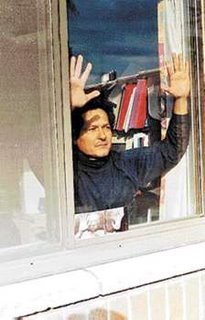 Brian Austin Whitney, founder and tireless promoter of the remarkable grass-roots music organization, Just Plain Folks (of which I'm a member -- even performed at one of his benefits when he swung round in his van thru Montreal last June), is also an eloquent and impassioned commentator where it comes to moral as well as morale support for independent artistic expression in any form. I post this from my archives because I found it inspiring ... whatever we may think of what I take to be a folky affectation -- that reference to "the most important Poets in US History" -- well it is all up to US, when it comes down to it . . . anyway, this should perk a few of you up. Enjoy!
Brian Austin Whitney, founder and tireless promoter of the remarkable grass-roots music organization, Just Plain Folks (of which I'm a member -- even performed at one of his benefits when he swung round in his van thru Montreal last June), is also an eloquent and impassioned commentator where it comes to moral as well as morale support for independent artistic expression in any form. I post this from my archives because I found it inspiring ... whatever we may think of what I take to be a folky affectation -- that reference to "the most important Poets in US History" -- well it is all up to US, when it comes down to it . . . anyway, this should perk a few of you up. Enjoy!Welcome to Just Plain Notes!
Just Plain Notes: Volume 1.138, April 19, 2004
Written by Brian Austin Whitney
****************************
Just Plain Quotes:
"I have always felt that a politician is to be judged by the animosities he excites among his opponents." -Sir Winston Churchill
"While we have the gift of life, it seems to me that only tragedy is to allow part of us to die - whether it is our spirit, our creativity, or our glorious uniqueness." -Gilda Radner
"The great French Marshall Lyautey once asked his gardener to plant a tree. The gardener objected that the tree was slow growing and would not reach maturity for 100 years. The Marshall replied, 'In that case, there is no time to lose; plant it this afternoon!'" -John F. Kennedy
"Being an original artist often means accepting that your talent, passion and vision must rely more on your self motivation, self preservation and self esteem than anyone else's."
-Brian Austin Whitney
My Take:
It's always been tough to be an original. Our society has long embraced the familiar, more now than perhaps ever in history. We seem to flock to the same stores and the same restaurants and the same movies and the same music no matter where we go. When I travel around the US it seems there's less and less to distinguish between one city and the next. Fortunately at least the terrain is different, otherwise I wouldn't know the difference between Denver, Portland, Indianapolis, Tampa, Houston or Los Angeles.
The music industry and many of their practices simply reflect much of this preference by the public. What artists see as watered down, ho hum music on radio is really just the equivalent to having a Gap, Walmart, McDonalds and Best Buy in just about every city you visit. People also flock to the same sporting events, buy the same books, watch the same TV shows and so on. Our industry is really no different. Radio consolidation has created the musical version of the fast food restaurant chain. (Would you like a McSong with those radio advertisements?) But somehow, we still need to soldier on if we want to be artists and not simply tools of commerce.
Don't get me wrong, there is convenience and comfort in familiarity, and with all our lives being bombarded by more stimulus than any humans have previously had to face, I don't see an end to what I consider to be the "blandification" of our world. (Yeah, not a real word.. but you can tell folks I coined it here first!) Even with the new digital technology that will make our music available to anyone on demand anytime they want it, don't get your hopes up too much that the Britney's of the world won't still rule. They probably will.
Throughout history, being an original artist and creator has always meant having to rely more on your self motivation, self sufficiency and self esteem than that which you get from others. Sometimes the work you do will blaze a trail (often long after you're out of the picture) that will eventually become part of the mass market (and thus bland) world. Rap music is the most recent example of this. Once considered the most controversial and ground breaking genre of music, it's been watered down for the masses to become the same homogenized and palatable mass market product that R&B, Pop and Country have all become.
Sometimes people will get up in arms against what you do (which means you're probably really on to something good). And other times, people simply won't notice what you're doing at all. But if you're an artist, you'll do it anyway. And you'll perfect your own brand of unique vision and output in the context of your abilities and resources. If you do that, you're not only a real artist, but a legitimate success at it, unless of course you only validate your art based on commerce. I've long believed that art and commerce are two separate things. Most successful artists understand that and work to make sure those two things cross paths enough to pay their bills.
There's always hope your art will be discovered, even if it's later than you planned. Emily Dickinson, considered one of the most important Poets in US History, had only a handful of poems published in her lifetime (all without her knowledge) and the few she actually submitted were roundly rejected. Of course immediately after her death her work was "discovered" along with hundreds of poems she had never shown to anyone. Commerce never found her, but society and the world did. Her art transcended contemporary commercialism.
Believe in yourself and your work on it's own merit. Let the critics and the mass market catch up on their own. If they do, just like Emily Dickinson, your work will eventually be available in every town in every country in the world. If they don't, to paraphrase what William Hung said on American Idol, "you did your best and that's all you CAN do."


